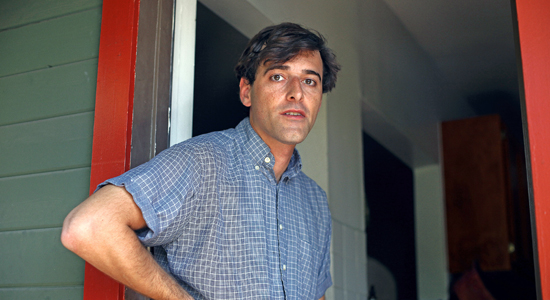
The unlikely virtues of chastity imbue Ducktails’ most personal album yet
As Ducktails, Matt Mondanile has released cassettes of instrumental noodlings as well as albums of ambient abstractions and gentle songs. Ducktails has been a bedroom project and a band.
“It’s just my solo music,” says Mondanile, who also plays guitar in Real Estate. “It could be called Matt Mondanile, but I just call it Ducktails because when I was younger I named it that. I wrote it on a cassette as a fake band name. It’s basically whatever I want; each record is its own little thing: unique.”
St. Catherine is Mondanile’s fifth o fficial album, and it is indeed its own unique thing, although perhaps not little. Unlike 2013’s The Flower Lane, which Mondanile recorded with his then-current touring band, St. Catherine is primarily a solo a ffair, but with some key additions. He drafted Julia Holter and the string players from her band, and coerced veteran producer Rob Schnapf (who’s worked with Elliott Smith, Beck and Guided By Voices) to help finish the tracks. It’s Mondanile’s most textured and personal album, and one that will appeal to fans of Real Estate’s wistful, reverberating guitar rock even though it doesn’t sound quite like Real Estate.
Mondanile worked on it amidst Real Estate tours (the band has been on the road a lot since 2014’s Atlas), and he finished it after he moved from New York to L.A. in early 2015. From the start, he wanted the album to sound di fferent from his past work, and as he demoed the tracks, he added provisional synthesizer lines for string parts.
“I was interested in having strings on the record, and I wanted it to have a dreamy, baroque, medieval vibe to it,” says Mondanile. “I wanted it to seem like some kind of dreamy, orchestral universe, and I wanted it to sound really lush.”
He had met Holter, the L.A.-based experimental-pop artist, in Australia during a tour, and the two became friends. She adds ethereal, angelic vocals to tracks such as “Heaven’s Room” and “Church” on St. Catherine, while her string players lend gravitas to “Medieval” and others. The album ranges from easygoing, Stereolab-like instrumentals such as “Disney Afternoon” and “Krumme Lanke” (named after the Berlin lake where it was written) to more emphatic, electric guitar-based songs like “Into The Sky” and “Headbanging In The Mirror” to the woozy, drifting meditation of “St. Catherine.” St. Catherine of Assisi is the patron saint of knowledge.
“I was raised in the Catholic church—I would read about imagery of stu like that when I was younger,” he says. “I was researching her on the internet, and I decided to write this song about her. The lyrics are metaphors for St. Catherine’s life. She was blinded by the light; she would only sleep with God. She was crucifi ed by men because she wouldn’t give her body up to them; she was holding out for Jesus Christ. I thought that was a tragic and interesting story: this woman who had this thing in mind and wouldn’t budge and was harmed for her own intentions.”
Electronic artist James Ferraro, who drops in to play synths on “Headbanging,” suggested Mondanile use “St. Catherine” as the album title. The record’s overall narrative is part autobiographical and part embellishment.
“It’s kind of about getting into a relationship, moving somewhere, and then having the relationship dissolve,” says Mondanile. “I was trying to be clear, lyrically, explaining that, so a lot of the songs are love songs. It has to do with a very intense relationship that I was in and being in a new place, and coming out of that, the repercussions of dealing with that.”
Indeed, the religious imagery became a unifying motif for the album. “It’s a loose theme that I had for the record,” says Mondanile. “I wanted the image to come across of maybe like a bummed-out altar boy was dumped and then freaking out. That was kind of my concept for the record. It was kind of strange: a Catholic boy, thrown into the world and making these metaphors because they’re the only thing he knows, his religious beliefs. Not that I’m a practicing Catholic.”
—Steve Klinge






